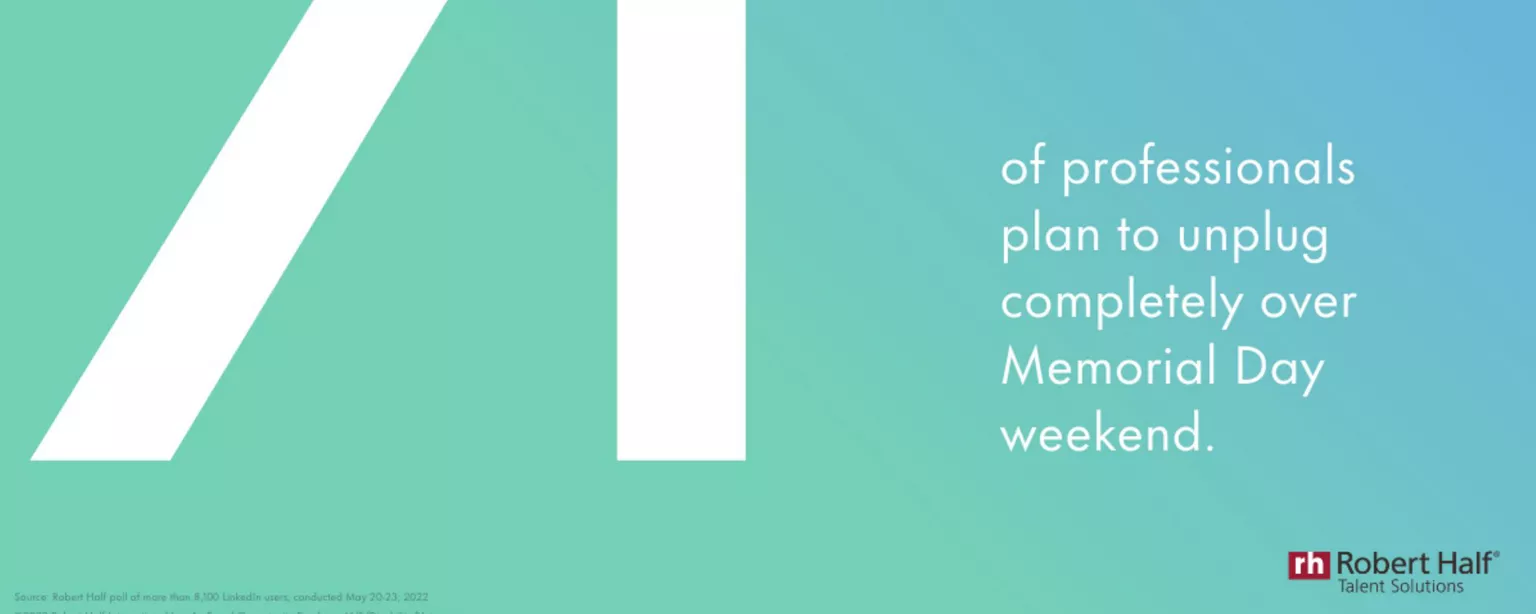In today’s hyper-connected, work-from-anywhere world, it’s easy to feel like you’re required to be on the clock 24/7. However, a better plan is to take time off when you need it — and unplug as much as possible on days when you don’t have to be at work.
For example, take Memorial Day weekend. First and foremost, it’s a time to remember and honor U.S. military personnel, but the holiday weekend is also widely seen as the unofficial start of summer. Many workers in the United States have a full, three-day weekend to enjoy. And in an online survey conducted by Robert Half, 71% of professionals said their aim this Memorial Day weekend is to disconnect completely from work.
If the thought of unplugging fully from your job, even for just one weekend, raises your stress level, that’s not a good sign. We all have to relax and let go of work sometimes. And there can be a lot of upside for you, both personally and professionally, when you do take time to recharge. For example, you can:
1. Increase productivity and creativity
Even quick breaks during the workday can help you maintain focus and boost your productivity and creativity. Stepping away briefly can help you feel more refreshed so that when you return to your desk, you can tackle your to-do list with even more vim and vigor.
What can you do to re-energize while on your break? Here are just a few options:
- Take a brisk walk outside, or just sit in the sunshine
- Grab a healthy smoothie, herbal tea or a light snack
- Listen to music you love (and crank up the volume, if you can!)
- Reorganize your workspace and declutter
- Meditate or practice deep breathing techniques
2. Maintain a better work-life balance
Many companies now offer remote and other flexible work arrangements to their employees, which can enhance work-life balance. But as many professionals have learned during the pandemic experience, working from home needs to be managed effectively, or it could actually lead to work-life imbalance.
Windowed work, or the practice of breaking up your day into distinct chunks of business and personal time, can help. Here are some quick tips for using this method:
- Identify your power hours. Reserve this high-productivity time — morning, late afternoon or evening — to concentrate on tasks that require the most skill and focus.
- Group similar activities. Try to cluster tasks that require similar effort and resources, and block off hour-long increments, or longer, to get them done.
- Keep your schedule current and share it. Keep colleagues in the loop on times that are best for you to meet and collaborate throughout the workweek, and when you are unavailable or would prefer not to be disturbed.
For more tips on remote work success, see this post from Trisha Plovie, senior vice president, Future of Work, at Robert Half.
3. Enjoy brand-new experiences
Just as taking short breaks during your workday can boost productivity and creativity, getting away from the office for a vacation can help you rejuvenate. It can also keep you from burning out. And know that burnout is on the rise, too: In a recent Robert Half survey, 41% of U.S. professionals said they are more burned out now than they were a year ago.
There is another benefit that vacation time can provide: It offers an opportunity to experience new things, go to new places and meet new people. Even if your vacation is a staycation, you can still do many things to enrich your mind, promote your wellness and just have fun while you hit the pause button on work.
But ... that is the key to a successful vacation: taking time away from work. To help ensure you can do that, you should:
- Make and communicate your plans as early as possible. Let your manager know when you’re expecting to take time off. And try to avoid being on vacation during especially busy times for your company or team, or when special projects may require an all-hands-on-deck approach.
- Set up an “out of the office” message. Do this for email and voicemail. If possible, include contact information for a colleague your boss has designated to manage any urgent matters while you are out.
- Resist the urge to check in with work. If you keep dipping back into work while on vacation, how can you fully recharge? Plus, your colleagues and clients will assume it is OK to interrupt you and that you will respond to requests promptly while you are out.
Even the busiest professionals deserve to take breaks, so make sure you regularly set aside time to unwind. And when you do pivot back to work, you can hit the ground running with renewed energy and enthusiasm — making you even more effective in your job and career.
Still don’t think you can truly unplug from work when you need to? It might be time to look for a new job. As a starting point, try searching the Robert Half website. It never hurts to explore your options, whether you are interested in an on-site or remote work opportunity.





